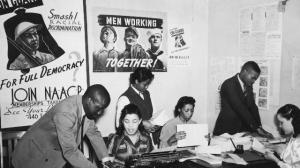“People cannot be free until there is enough work in this land to give everybody a job.”– Ella Baker
Ella moved to New York City after graduating college in pursuit of a job, and met many people who influenced her passion for social justice. “New York was the hotbed of social thinking,” Ella recalled.In NYC, she received a taste of the radical political activism that would later define her. She recalled her first discussion of communism with a Russian Jew she met in Washington Square Park, and meeting many persons affected by poverty and hardship as the Great Depression bore on.1 In 1930, Ella began one of her first efforts at social improvement with the creation of the Young Negros Cooperative League. The YNCL served to develop black economic power by forming cooperative groups to pool community resources and provide less expensive goods to members.2
Ella began working as a field secretary for the National Association for the Advancement of Colored People (NAACP) in 1942, traveling across the country for her work.3 In this position, Ella made her first trip to Birmingham, Alabama and was shocked by the Deep South culture.She was appointed as the National Director of Branches for the NAACP in 1943, a position she held until 1946.4
During her time at the NAACP, Ella grew increasingly frustrated by the lack of organization at a national level and between local branches. She did not feel particularly disadvantaged by her role as a female black leader, and felt few problems identifying with women or men. She took much more of a human-based approach to rights rather than a gender-based approach, and explained “my man-woman relationships were on the basis of just being a human being, not a sex object”.5 In 1946, she left the NAACP to raise her 7 year old niece Jackie. She soon became involved as a local New York Director of the NAACP and worked for educational activism and school integration.2
Sources for this page:


